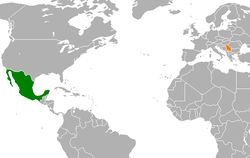Mexico–Serbia relations
 |
|
Mexico |
Serbia |
|---|---|
Mexico–Serbia relations refers to the diplomatic relations between Mexico and Serbia. Both nations were founding members of the United Nations and the Group of 77.
History

Mexico and the SFR Yugoslavia established diplomatic relations on 24 May 1946.[1]
In 1991, Yugoslavia entered into a series of ethnic conflicts known as the Yugoslav wars. During the war, the United Nations Security Council passed Resolution 757 calling all nations to remove their diplomatic staff from Belgrade. As a result, Mexico downgraded its embassy to that of a Chargé d'affaires and refused the entry of any Yugoslav official wishing to visit Mexico. Furthermore, Mexican government officials were not allowed to travel to Yugoslavia.[1] By doing so, however, Mexico remained one of the few countries that opted not to close its embassy in Belgrade. In 1995, Mexico elevated its diplomatic mission in Belgrade back to an embassy and established diplomatic relations with the Federal Republic of Yugoslavia (later known as Serbia and Montenegro) as the successor of the SF Yugoslavia; and with the newly independent nations of Slovenia, Croatia, Bosnia and Herzegovina and the Republic of Macedonia.[1]
In 2006, the state union between Serbia and Montenegro dissolved and created two separate nations: the Republic of Serbia and Montenegro.[2] That same year, Mexico recognized the independence of Montenegro and continues to maintain diplomatic relations with the Republic of Serbia.
State visits

Presidential visits from Mexico to the SF Republic of Yugoslavia[1]
- President Adolfo López Mateos (1963)
- President Luis Echeverría Álvarez (1974)
- President Miguel de la Madrid Hurtado (1985)
Presidential visits from SF Republic of Yugoslavia to Mexico
- President Josip Broz Tito (1965 & 1976)
- President Sergej Kraigher (1981)
- President Lazar Mojsov (1987)
In March 1963, Mexico awarded its highest honor, the Order of the Aztec Eagle, to President Josip Broz Tito.
Agreements
Agreements between Mexico and SF Yugoslavia are being carried forward into agreements between Mexico and Serbia. In March 1950, both nations signed an agreement to establish trade relations.[3] In March 1960 a cultural exchange agreement was signed and an additional protocol trade agreement was signed in July 1963. In addition, a scientific and technical cooperation agreement was signed between both nations in February 1974.[3] In July 2010, an agricultural agreement was signed between both nations.[4]
Trade
In 2012, two-way trade between Mexico and Serbia amounted to $2 million USD.[5] Mexico's main exports to Serbia include: computer memories and mother boards, tobacco and minerals; while Serbia's main exports to Mexico include: car tires (tyres) and clothing.[5]
Famous Serbs in Mexico
As manager, Bora Milutinović led the Mexico national football team to the 1998 FIFA World Cup knock-out stage.
Resident diplomatic missions
- Mexico has an embassy in Belgrade.[6]
- Serbia has an embassy in Mexico City.[7]
See also
References
- 1 2 3 4 History of diplomatic relations between Mexico and Serbia (in Spanish)
- ↑ CIA factbook: Montenegro
- 1 2 Tratados Internacionales vigentes en México (in Spanish)
- ↑ México y Serbia firman acuerdo agropecuario (in Spanish)
- 1 2 Mexican Ministry of Economy: Serbia (in Spanish)
- ↑ Embassy of Mexico in Belgrade (in English, Serbian and Spanish)
- ↑ Embassy of Serbia in Mexico City (in English, Serbian and Spanish)

